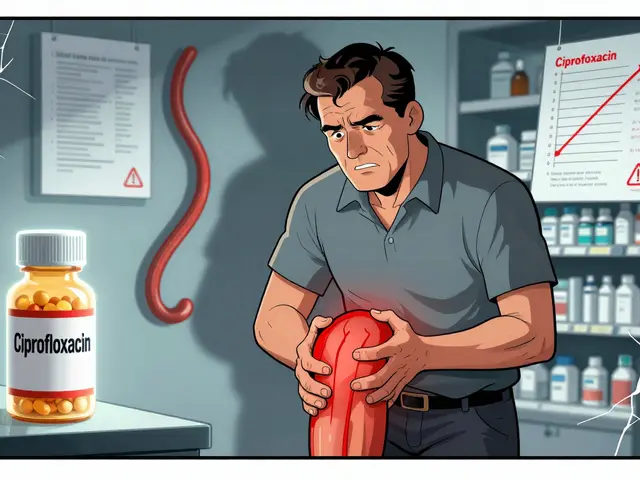Ever feel like you're running on empty, even after a good night's sleep? Or maybe your body throws random curveballs—joint pain, fatigue, skin issues—that make no sense. We often blame stress and diet, but sometimes the culprits lurk deeper: key players like your immune system, those quietly working vitamins, or the medication you take without a second thought. Azathioprine and B vitamins might not sound like a power duo at first glance, but their impact on your energy, health, and everyday life is way bigger than most people realize. If you’ve ever taken immunosuppressants, worried about feeling wiped out, or just want to get your bounce back, this is the read you need. Let’s break down the science, shake out the facts, and give you real, doable advice you can bring to your next doctor’s appointment—or just your kitchen table.
Understanding Azathioprine: What It Does and Why It Matters
Azathioprine isn’t something you just come across in your standard vitamin aisle—it’s a heavy lifter in the world of medicine. Doctors prescribe it mainly for autoimmune conditions: think rheumatoid arthritis, lupus, Crohn’s disease, and to keep organ transplants from being rejected. Why? Because azathioprine reins in the immune system, telling it to cool off so it doesn’t attack your own body or a transplanted organ.
Here’s what sets azathioprine apart. It works by interfering with the production of DNA, essentially slowing down overactive immune cells. That means less inflammation, less tissue damage, and, for many, a major reduction in symptoms that can otherwise take over daily life. But with that power comes some trade-offs. People often report fatigue, higher risk of infections, and sometimes their bodies struggle with nutrient absorption, especially B vitamins. Azathioprine’s effect on bone marrow can drop your white blood cells, platelets, and red blood cells. That’s good for an out-of-control immune system but bad news for your energy and ability to fight off bugs.
The big question many folks have: “Am I doomed to feel tired and run-down forever?” Not at all. It’s about understanding your medication and working smarter—not harder—with your nutrition and self-care. Regular blood tests are a must when on azathioprine, as they catch problems early. Pay attention to red flags—bruising, unusual infection, mouth sores. There’s a reason most clinics run your blood every month or two if you’re on this drug long term.
What’s interesting is how azathioprine’s job—turning down the immune response—sets off a chain reaction. Your body’s nutrient demands change, some vitamins are used up quicker, and fatigue can set in as collateral damage. This brings us straight to the B vitamin connection, a story that actually affects way more people than you’d guess.
B Vitamins: The Unsung Heroes for Energy and Nerve Support
If azathioprine gets all the action in your prescription list, B vitamins are those essential workers that keep engines running behind the scenes. There isn’t just one “B vitamin”—there are eight: B1 (thiamine), B2 (riboflavin), B3 (niacin), B5 (pantothenic acid), B6 (pyridoxine), B7 (biotin), B9 (folic acid), and B12 (cobalamin). Each one tackles a different but related job, mainly making sure your cells turn fuel into energy, building blocks for DNA, and happy, healthy nerves.
The big three for most people on azathioprine? Folic acid (B9), B12, and B6. These are crucial for your blood health, DNA repair, and keeping homocysteine levels (a marker linked to heart health) in check. When you take azathioprine, your body can burn through more B vitamins or have trouble absorbing them, especially if you already have gut issues from something like Crohn’s. Even mild deficiencies can leave you foggy, weak, and—yes—exhausted.
Here’s a stat that grabs attention: About 40% of people with chronic inflammatory diseases show some level of B12 deficiency, and nearly as many have low folate, according to a 2023 review published in the Journal of Autoimmunity. The numbers go up if you add medications like azathioprine. Symptoms range from mild brain fog to severe anemia. If your tongue’s sore, your hands tingle, or your legs feel like jelly, B vitamins might be the missing link.
B vitamins pack a real punch for mood, too. Ever noticed anxiety or low motivation get worse along with your physical symptoms? Nerve health and mental well-being are closely tied to B-vitamins, especially B12 and B6. While they’re water-soluble—meaning your body doesn’t store them for later—high stress, gut issues, or certain meds can make you need even more. Adding a basic B-complex supplement or tuning up your diet can help fill those gaps. But you want to check with your doctor first, especially since some B vitamins, like B6, can be harmful in mega-doses.
| B Vitamin | Main Role | Common Food Sources | Deficiency Signs |
|---|---|---|---|
| B6 (Pyridoxine) | Nerve health, mood, metabolism | Poultry, fish, potatoes, bananas | Numbness, anemia, confusion |
| B9 (Folate) | DNA repair, red blood cells | Leafy greens, beans, citrus | Tiredness, mouth ulcers, poor growth |
| B12 (Cobalamin) | Nerve function, DNA synthesis | Meat, dairy, eggs, fortified cereals | Fatigue, memory issues, tingling |

The Interaction Between Azathioprine and B Vitamins
This is where things get interesting—and where you really want to pay attention if you’re juggling azathioprine and nutrition. Azathioprine’s main side effect list centers on blood counts, susceptibility to infections, and—you guessed it—possible vitamin depletion. The process isn’t direct, but it matters. Since azathioprine disrupts cell division, especially in fast-dividing cells (like those in your gut and bone marrow), it can indirectly raise your body’s need for B vitamins, especially when your guts aren’t absorbing well.
Some research is crystal clear: when you suppress the immune system, your absorption of certain nutrients takes a hit. People with IBD (inflammatory bowel disease) or autoimmune conditions already struggle to keep B12 and folate levels up. A 2022 UK study found that people with Crohn’s taking immunosuppressants like azathioprine had B12 and folate levels 20% lower than healthy peers. The kicker? The difference was sharper in those with small intestine involvement, since that’s where B12 gets absorbed.
So, should you be supplementing? Not blindly. Too much folic acid, for example, can mask a dangerous B12 deficiency. The trick is to know your numbers and keep up with blood work, especially if you start to notice new or unexplained symptoms. For those already struggling with absorption, like after gut surgeries or long bouts of inflammation, your doctor might swap in injectable B12 instead of pills, which sidesteps gut absorption completely. Folate can usually be topped up with a supplement or extra leafy greens, but keeping an eye on your whole vitamin picture matters most.
If you’re shopping for fortified foods, it’s worth checking out cereals or nut milks with B12 added—especially handy for vegetarians. Supplements aren’t magic bullets, but they can close the gap while your body recovers or medication balances out. Always double-check before starting anything new: mixing supplements with prescriptions sometimes causes unexpected interactions.
Energy, Immunity, and Beyond: Everyday Benefits of Getting It Right
Here’s where the rubber meets the road. When you manage your B vitamin levels alongside careful monitoring of azathioprine, you can start to reclaim the energy, focus, and everyday resilience that get steamrolled by chronic illness and medication side effects. It’s not just about feeling better in the morning or bouncing back after a rough week—long-term, people who get their nutrient balance dialed in actually report fewer infections, improved recovery from flares, and sharper focus at work or school.
Proper B vitamin intake shows up in places you might overlook: smooth skin, fewer mouth ulcers, stronger hair, better sleep. There’s this happy domino effect—you protect your nerves, which boosts mood, which improves motivation, which helps you stick to healthier habits, and so on. Some clinics even use energy and mood questionnaires at regular intervals to track quality of life in people on immune-suppressing drugs.
Hydration, sleep, and diet are your main backup singers here. Skipping B-rich foods, especially under stress, is common. Eggs, fish, beans, dairy, and greens are go-tos that fit even busy schedules. Feeling trusty but tired? Keep a food diary for a week and see if anything’s dropping off. About three-fourths of people with B-vitamin deficiencies eat fewer than two servings a day of the right foods—an easy fix if you know what to look for!
Some real-world tips: Don’t take B-vitamin tablets on an empty stomach—they absorb better with food. Aim for small, frequent meals instead of big, rare feasts. Watch alcohol intake—it depletes B vitamins quicker than you’d think. If you feel a sudden slump in your energy, don’t just write it off as stress—ask your doctor for a vitamin check with your next set of labs.

Smart Strategies for Living Well on Azathioprine
Staying ahead of issues isn’t about drowning in supplements or living off kale. It’s about working with your body and your doctor—finding the sweet spot where medication and nutrition team up for your health. Set reminders for blood tests. If needles or clinics stress you out, ask if you can bundle appointments. Most side effects can be detected early if you’re honest about how you feel, so keep a small symptom diary—nothing fancy, just a few notes in your phone every week.
If you find yourself falling into energy slumps by midday, check your meal pattern—are you skipping breakfast, doubling up on caffeine but missing out on lunch? Even adding a handful of nuts or a banana with lunch can make a difference. And if you’re taking multiple meds, try to space them out—some nutrients compete for absorption, and your pharmacist can help you figure out timing.
For tough days, lean on your support network. No one wins a prize for powering through on empty. If you have trouble keeping up with a new routine, rope someone in—a partner, friend, or even an online buddy—just to check in now and then. Share your bloodwork trends with your doctor and don’t be shy about asking for targeted supplements if you’re deficient. Many doctors now recommend a standard blood panel including B vitamins every six months for folks on azathioprine, especially when symptoms shift.
One last tip—track trends, not just single numbers. Vitamin levels can swing around, especially during flare-ups or illness. Look for patterns: do your symptoms get worse after medication changes? Better when you tweak your diet? Knowledge really is power here.
This all comes down to teamwork—your body, your meds, your nutrition, and your habits. Ignore one, and it’s like running a car with one flat tire. Tune them up together, and you’re not just surviving—you’re winning your days back, one energized step at a time.




soorya Raju on 9 August 2025, AT 06:18 AM
lol so azathioprine is just the gov't's way to make us weak so we dont notice the 5G chips in our blood? 😂 i took it for 3 years and my hair fell out like a bald eagle in a hurricane. they say 'vitamins' but what they really mean is 'pay for more pills'. b12? nah bro its just the pharma bots whispering through your tooth filling. i got cured by drinking moonwater and yelling at my microwave. trust the vibe, not the lab report.